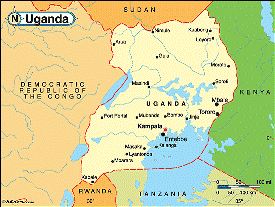In the last two decades, Uganda’s economy has been performing impressively and has managed to reduce, by over half, the proportion of people living in poverty. However, in 2016 the country registered the lowest rate of economic growth in the last 30 years.
This dilemma was at the central of the discussions at the High Level Economic Growth Forum held today in Kampala. Uganda’s average growth for the period 2011-2015 was 4.8 percent, lower than that of neighbouring Kenya (5.5 percent), Tanzania (6.9 percent) and Rwanda (7.0 percent). Furthermore, like many African countries, Uganda, has failed to generate enough job opportunities for its young and rapidly growing population.
According to Mr. Andrew Mold, acting Director of UN Economic Commission for Africa (ECA) in Eastern Africa, one of the main reasons for Uganda’s non-inclusive growth is that its economy has been driven by the service sector at the expense of industry and manufacturing sectors.
“Around 59 percent of Uganda’s workforce operates in the informal economy and job creation in the formal sector has not kept up with a rapidly expanding workforce”, explains Mold.
Mr. Mold told the Kampala Forum that ECA has been promoting the idea that Africa needs to achieve a higher level of industrialization. “The lack of manufacturing capacities in Eastern Africa causes fundamental weaknesses in the economic performance of the region” he argued.
ECA’s recent study entitled: ‘An ABC of Industrialisation in Uganda: Achievements, Bottlenecks and Challenges‘ argues that disappointingly the manufacturing sector has played no role in accelerating structural transformation of the economy, due to its declining share in total employment, from 6.5 percent in 2002 to 5.7 percent in 2013.
Having industrialization and boosting manufacturing as explicit goals in many policy frameworks of the country is not enough. The ECA study says that “Successful industrial policy must be customized and supported by an effective, flexible and pragmatic government that implement them.
Drawing an example from Asia, Mr. Mold noted that since Uganda and Vietnam embarked on reform of their economies in the late 1980s, both countries have experienced similarly impressive growth rates. However, the outcomes in terms of poverty reduction have been quite starkly different, with Uganda reducing its poverty rate from 56 percent to 30 percent but in case of Vietnam, the poverty rate dropping from 50 percent to 3 percent.
“Part of the explanation for this difference is explainable by the fact that the manufacturing sector played a significant role in that structural change in Vietnam and has thus had a much better record in job creation and poverty reduction”, affirmed Mold.
Mr. Mold urged experts at the forum to make industrial policy more effective by learning from experiences of peers, such as Ethiopia, and coordinate with other countries across the East Africa Community to develop regional value chains.

